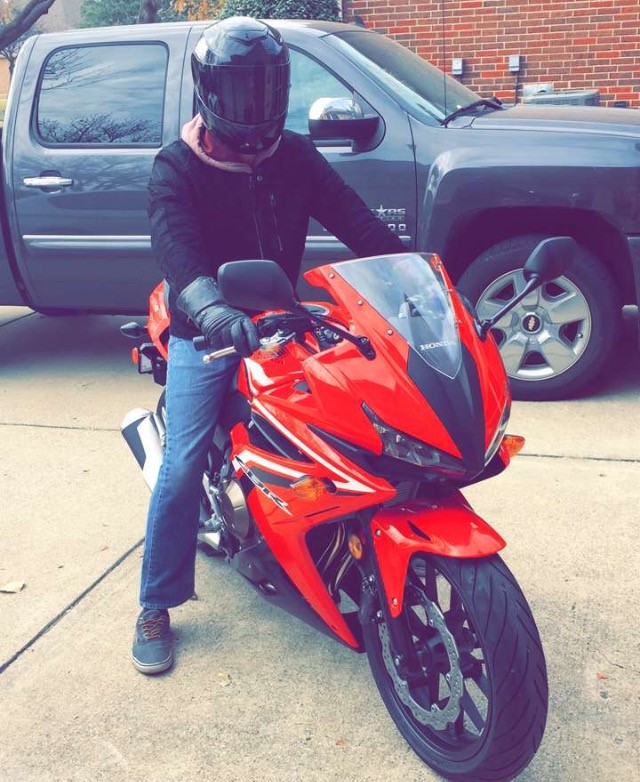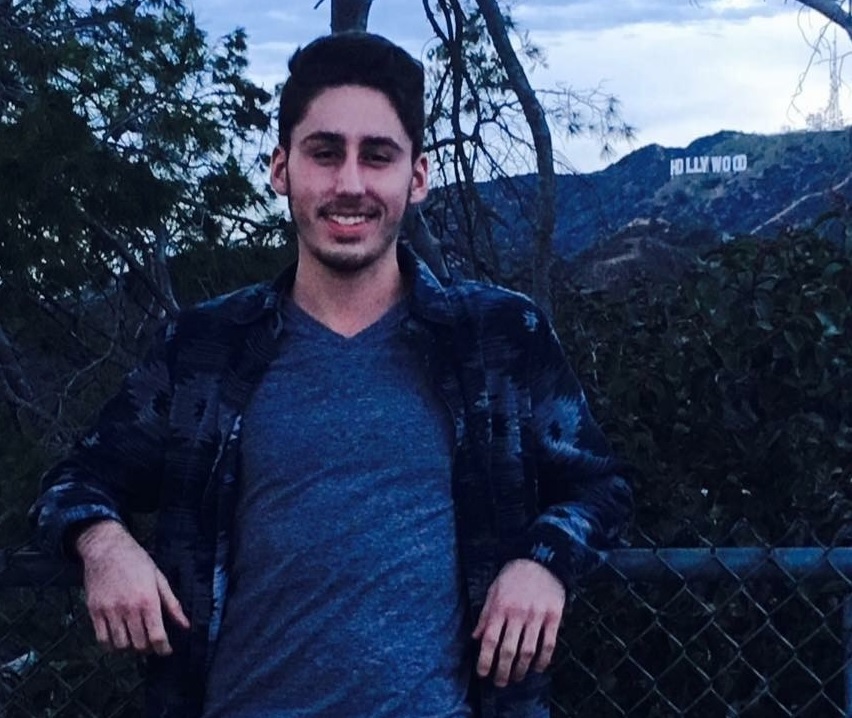Pate graduate Ben Cooper has resumed his life after rehabilitation for a brain injury he sustained while riding his motorcycle (and he was wearing a helmet). During rehab he wrote the following academic style essay as part of his treatment so he could return to college.
We asked if he’d share what he wrote for people who are just beginning the path to recovery. Ben generously agreed and said he’d be elated if his words could encourage and motivate someone else for the task ahead.
Read on, his story is extraordinary.
Loving the Road is Dangerous
by Ben Cooper
Everyone falls into a routine and turns on autopilot; all the while, the thought that life could change in a single moment seems to vanish. Generally, it is not necessary to constantly ponder the fact that life is inconstant, but it is dangerous to assume that life is fair. This universal truth becomes apparent at some point, and the reality for every single individual is that life can change at any moment. In my case, my life changed upon ramming head first into a red, four door, Chevrolet Z7l truck at forty miles per hour while on my motorcycle.
In 2017, I became a statistic on the 23rd of August. The National Highway Traffic Safety Administration estimates that “in 2015, 88,000 motorcyclists were injured [and] 92,000 [were injured] in 2014;” it sends a shiver down my spine knowing that I will be recorded as one of the people injured in 2017 (NHTSA 1).
Most riders, like myself, get injured or killed while riding and it is not their fault, whatsoever; motorcycle riders are notoriously better drivers than car-only drivers, and it must be this way. While operating a car, the driver is completely enclosed in a protective cage: they have airbags, and even seat belts to prevent injury. On the other end of the spectrum, motorcycle riders have virtually zero protection in the case of an accident; yes, a helmet and protective clothing can be worn, but I learned the hard way that a helmet and clothes do not keep one safe from harm. Thus, motorcycle riders are forced to drive much more carefully than car drivers, and they become more cognizant individuals while on the road – any rider that is unaware of this principle is destined for injury or death.
Luck, modern medicine, and God’s will kept me alive; it did not matter that I was always safe while riding and that I devoted my full, and undivided attention to the road. Things happen that are out of one’s control, and my story is a perfect example of such a situation. Because he (somehow) did not see me coming, the man driving the red, Chevrolet truck took a left turn directly in front of me, and I was forced to T-bone the passenger side of his vehicle at forty miles per hour. I was knocked unconscious upon impact, and I laid lifelessly in the middle of the road covered in my own blood; but, where was the man who turned in front of me and caused the accident? He did not check on me, whatsoever; instead, he attempted to find witnesses that would say the accident was my fault, of course.
Upon evaluation by the medical team present after my accident, it became evident that I needed to be air lifted to the hospital instead of taken by ambulance; to say that I was in critical condition would be an understatement. I was having “an involuntary flexion or extension of [my] arms and legs, [which] indicat[ed] severe brain injury,” and I was not breathing on my own (Wiki Par.2).
Unbeknownst to me in the moment, I had a very hard and long road ahead. I was not even expected to survive – the police collected all of my belongings (along with my clothes) that I had with me and placed them in their evidence locker, because they expected to be doing the paperwork for a fatality accident.
After a multitude of tests at the hospital, they discovered that my major injuries (worth mentioning) were: several bleeds in my brain, swelling of my brain, a two millimeter shift of the midline of my brain, a broken ankle, a broken nose, and multiple broken bones in my face.
Due to the severity of my injuries, I was breathing with a ventilator and I was placed in a medically induced coma; “when a patient is put in a medically induced coma, the brain is able to rest and swelling is more likely to decrease [and] pressure on the brain also reduces, hopefully preventing some brain damage from occurring” (ASAHQ 3).
Thankfully, I became stabilized in my coma, and I began breathing on my own; these may sound like small victories, but they were so vitally important. I slowly improved over the next few days, and then I transferred to a rehabilitation hospital after constant supervision by trauma specialists for a week.
Upon arrival at the rehabilitation hospital, I realized that I could not remember much of anything from the hospital I just vacated; one thing was certain in my mind though: hospital beds SUCK! I knew that I had to suffer through the uncomfortable beds, though, because I needed help. Due to the damage in the frontal, temporal, and parietal lobes of my brain, I was expected to have “difficulty with problem solving, difficulty with language, mood swings, irritability, concentration problems, a change in [my] personality, difficulty with math, memory problems, and a change in [my] sexual behavior” (Mayfield 2).
Please understand that this is a brief list; describing every possible problem would take pages upon pages to list. I expected the worst. If all of that was not enough, I had to worry about having seizures, too; according to Dr. Brian Greenwald, the medical director for the Center for Head Injuries, “approximately 5-10 percent of individuals with traumatic brain injury experience new-onset seizures” (Greenwald 1).
After less than a month in hospitals, I was released, and then I began my outpatient therapy at Pate Rehabilitation. At first, I did not see a reason as to why I needed to be in therapy; however, I soon began noticing my deficits, and I realized that therapy is exactly what I needed.
Everything felt so different after my accident, and it still feels different now; it is impossible to put how I feel into words. However different things may be, I realized that there is nothing I can change; I chose to face life head on, instead of letting my unfortunate circumstances bring me down. I fostered this philosophy after spending a few days at Pate Rehabilitation; everyone seemed so cheerful, even though their injuries and debilitations were much more significant than mine. One day, it all clicked after I came to the conclusion that I could be dead, but God gave me another chance; I would be a fool by not living life to the fullest.

After spending several weeks focusing on bettering myself at Pate, I am ready to leave with the confidence that I can accomplish anything. I have been riding another motorcycle for a few weeks now, and I made it a point to drive through the same intersection where my accident happened…..the FIRST time I hopped back on a motorcycle. I am choosing to adapt and conquer my new life, and I will not let my injuries define me. This is not the end of my happiness nor the end of my life, this is a new beginning. I believe in happy endings; if things are not happy right now, it must not be the end.
I am returning to the world as a stronger person now; I have accomplished so much. On August 23rd, I T-boned a Chevrolet Z7I at 40 miles per hour; not even three months after receiving a brain injury from the motorcycle wreck, I drove myself to my last day of therapy on a motorcycle. Now that is a story, but it is just the beginning of Ben Cooper.
Ben added this footnote:
“This is an MLA style, college level essay that I wrote while at Pate, because I am a twenty year old college student; my whole goal at Pate Rehabilitation was to return to my normal activities, and I did exactly that.
For college, I have to write papers all the time; writing about my life changing experience was a perfect test to see how much I have progressed since my accident on August 23rd. This paper is more than just an activity that I did while in rehab, though. It is proof that things do get better. If I can slam head first into a truck, and still want to ride a motorcycle again and pursue my dreams, then you can do whatever you’d like in this world, just as easily.”
– Ben Cooper

